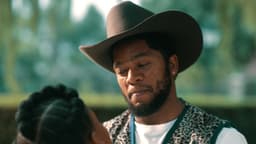
Basani Chauke on hosting Showmax and Moja Love's reality series Uthanda Bani?
Coming to terms with addiction is a challenging journey, but it becomes even more complex when it starts affecting your relationships. The internal struggle and external conflicts caused by addiction can leave individuals yearning for answers and seeking closure. In the reality show Uthanda Bani?, social worker Basani Chauke looks at real relationships plagued by addictions and provides a platform to find a path towards healing. The reality show steps in to assist couples who seek to remedy their addiction issues by offering therapy and intervention.
Watch the trailer for Uthanda Bani?
This is the third co-production between Showmax and popular channel Moja Love. Chauke is no stranger to TV - as a qualified social worker who specialises in couples counseling and gender-based violence, she has featured in another Moja Love reality series, Mina Nawe House, a show about couples seeking help finding the passion and spark in their relationships.
We spoke to Basani Chauke about her experience on Uthanda Bani?
What led you to agree to host the show?
As a new presenter or new kid on the block, it's an opportunity to showcase my skills and talent. When I looked at the concept of the show, I also realised that not only am I going in as a host but also as a helper. This is what I do every day: help people with their issues. I am a helper.
When a couple is faced with addiction, they need a helper. In every episode, I go into the house knowing that I am here to make a difference. The show is affording me that opportunity to continue helping and changing more lives, leaving them with hope. Now that Basani is here with the show Uthanda Bani?, they can see the light at the end of the tunnel.
Do you ever get nervous or anxious about having to be in someone’s space without their knowledge?
I definitely get nervous and anxious because I can imagine that if the person arrives with their cameras, they might become very violent when they feel cornered. They might want to attack or retaliate in some way. However, my biggest fear would be if the person doesn't want to give me a chance to actually help.

So, even though I'm here as a surprise to them, I mean no harm. My prayer is always, 'God, please allow the person to listen to me so that they can understand that I'm bringing hope and positive change'. It would be a shame if they completely refuse or if I have to leave without helping the person. So I do get worried and scared, and it's always a breath of relief when they finally say, 'It's fine, we can continue'.
Has there ever been an instance where a person totally refused?
There was an instance when they refused, but eventually, they agreed. The insults that the person threw at me were unlike anything I had ever experienced in my entire life. She didn't want to hear it, but luckily, she eventually opened up.
What’s the most shocking addiction story you’ve encountered?
I think, so far, the church episode is the one that hit me the closest because, as a churchgoer, it was truly shocking.

That's the episode that shook me the most. We grew up with grandmothers and mothers who spent all their time in church and encouraged us to go as well. We never considered it an addiction, but through that episode, I realised how bad it can actually be.
In your family, did you ever have anyone who struggled with addiction and how did you help them?
I believe the reason I became a social worker was because of my younger brother. He became addicted to drugs when he was only 13 years old. I tried my hardest to get him help, but it seemed like nobody wanted to assist. I grew increasingly upset and made a promise to all those people who refused to help: I would become a social worker and aid anyone in need.
Even to this day, addiction remains a struggle that we are dealing with. He has been to numerous rehab facilities. As we speak, he has isolated himself for several days, refusing to talk or see anyone. So, yes, I have experienced addiction within my own family. I have learned that no matter what you do, if the person is unwilling to accept help, it becomes incredibly challenging.
You are a registered social worker. What is it like having to do this in front of cameras?
It's different, but the good thing is that I have always aspired to be on TV. Throughout my upbringing, everyone knew about my desire to work in television.
When I arrived in Gauteng, I had no idea what it takes to build a career in TV. So when I finally received the opportunity to be a part of Mina Nawe House, I was incredibly nervous. However, as I sat there and interacted with people, I somehow forgot about the presence of the cameras. I believe that's what helped me. I simply saw the people as if we were in my office. My focus remains on addressing the needs of the individuals I'm assisting.
What kind of research goes into hosting a reality show like Uthanda Bani?
Remember, the show tackles unconventional addictions. These are the addictions that we didn't recognise as addictions before. So, every story is unique. For instance, I might encounter an addiction I've never come across, and when the research pack comes, I find myself wondering what I should even do for this person.
How do people even address these types of addictions? That's why it's always crucial to conduct research specific to each story you're dealing with. There's no way you can go in without doing research because you may encounter addictions you've never encountered before.
What thoughts and emotions arise as you embark on these diverse experiences alongside the addicts?
If there's one thing we learned a long time ago as social workers, it's not to bring our own emotions into the cases. I only bring empathy to these situations. Every day brings different emotions. When I arrive, emotions are usually running high, and I try to put myself in their shoes to truly understand what they are going through.
As we progress and work together, the burden begins to lighten. I find myself flowing with them, adapting to their emotional states. When they are happy, I also tap into that and celebrate with them.
You co-hosted a show called Mina Nawe House, how does that show differ from Uthanda Bani?
I think the shows are very common but Mina Nawe specifically focused on fixing relationships. We couldn’t pinpoint one specific issue; people just had lots of issues. So we would have to deal with all of those aspects holistically.
But what captured my interest with Uthanda Bani? was the involvement of addiction. This is where my expertise comes into play because addiction often leads to the creation of those problems within relationships. Here, we deal with addiction-related issues.
What are some of the lessons viewers will walk away with?
Firstly, it's important to educate ourselves about different types of addictions. We need to understand that addiction is not limited to drugs and alcohol alone, as commonly known. There are numerous forms of addiction, and I believe this show will serve as an eye-opener, revealing the extent to which individuals can become addicted.
The most significant outcome is that people will now become more adept at identifying when someone is struggling with addiction. The question arises: When do we determine that a person is truly addicted?
What would you say is the first step to dealing with any kind of addiction?
Admitting and acknowledging that you can’t live without a certain thing is crucial. For instance, let's consider food addiction - if you reach a point where you cannot function without a certain kind of food, it indicates that you are addicted. Once you recognise this fact, you have taken your first step towards recovery.
All the episodes of Uthanda Bani are available to binge-watch on Showmax..
More like this

The Neighborhood S1-8
When Dave Johnson and his family arrive from Michigan, they're unfazed that their new dream home is located in a community quite different from their previous small town.

Pearl Modiadie steps into her power in Law, Love and Betrayal S2
Pearl Modiadie talks about stepping into power as Ayanda in Law, Love and Betrayal S2, premiering 8th March on Mzansi Magic and 9 March on Showmax.

Bad Girls Bootcamp S1
A group of rebellious young girls are put through a reality-themed boot camp by their families. These ladies face multiple challenges intended to moderate their behaviours for a better life.

Jojo on The Real Housewives Ultimate Girls Trip: Africa reunion, social media backlash and more
Jojo opens up about the highly anticipated reunion for The Real Housewives Ultimate Girls Trip: Africa, coming to Showmax on 20 and 27 February.

South Africa’s stories and storytellers recognised as SAFTA nominees announced
Mzansi’s boldest stories take centre stage as the 2026 SAFTA nominees are unveiled, with a wave of nominations across DStv and Showmax.

Surviving Mormonism with Heather Gay S1
Former RHOSLC cast member Heather Gay investigates hidden truths within the Mormon church, exposing cracks in its perfect facade.

The ‘Burbs S1
In this adaptation of the 1980s Tom Hanks dark comedy, a couple moves back to the husband's hometown, only to face a cul-de-sac shrouded in mystery.

“You don't create something so powerful purely through military tactics” - Shaka iLembe co-creator
Shaka iLembe co-creator Desireé Markgraaff reflects on the vision, research, and importance of telling our stories. Stream Seasons 1–2 on Showmax.
The Mommy Club: Meet the mommies
The Real Housewives of Durban S3: Reunion Part II
More Mzansi gold

What to watch on Showmax in March 2026
Local gems, Showmax Originals, international hits and intriguing documentaries await Showmax viewers in March.

Brakpan Chronicles S1
What is true about the town of Brakpan and what is fiction? Do the jokes about this place have any basis in reality? In this two-part documentary, we aim to find the real Brakpan, the place that exists beyond the memes.

Pearl Modiadie steps into her power in Law, Love and Betrayal S2
Pearl Modiadie talks about stepping into power as Ayanda in Law, Love and Betrayal S2, premiering 8th March on Mzansi Magic and 9 March on Showmax.

Jojo on The Real Housewives Ultimate Girls Trip: Africa reunion, social media backlash and more
Jojo opens up about the highly anticipated reunion for The Real Housewives Ultimate Girls Trip: Africa, coming to Showmax on 20 and 27 February.
Latest Stories

What to watch on Showmax in March 2026

Bad Girls Bootcamp S1

Schalk Bezuidenhout trades stand-up for 9-5 in Die Kantoor

A heartbreaking loss: Nolwandle Biyela’s final stand in Outlaws Season 2

Fall in love with romantic drama Touch, now on Showmax

Antonie Marx on Volspoed and why it's a must-watch

Sandra Stein makes her debut on Law, Love and Betrayal S2

Albert Pretorius on Die Kantoor, SA’s re-imagining of The Office

20+ addictive South African reality shows to stream

Where to watch The Real Housewives franchise online

How to Train Your Dragon: Bringing Hiccup and Astrid to life

What to watch on Showmax in January 2026

7 things to know about indie award-winning movie Dìdi

Mission: Impossible – The Final Reckoning’s South African stunts

Die Kwiksilwers (2024)

Where to see the cast of Mpondoland on Showmax

Angel on The Real Housewives Ultimate Girls Trip, Jojo and more

Thandolwethu Zondi on his new role in Outlaws S2
Must-watch trailer for Showmax's turbo-charged reality series Volspoed

The Real Housewives Ultimate Girls Trip cast on first impressions, beefs and more

Fana Mokoena on playing a sangoma in Masinga

Princess Jecoco on The Real Housewives Ultimate Girls Trip Africa

Tlali returns: Outlaws’ most loved and hated villain is back

Novocaine: the US box office hit shot in Cape Town







